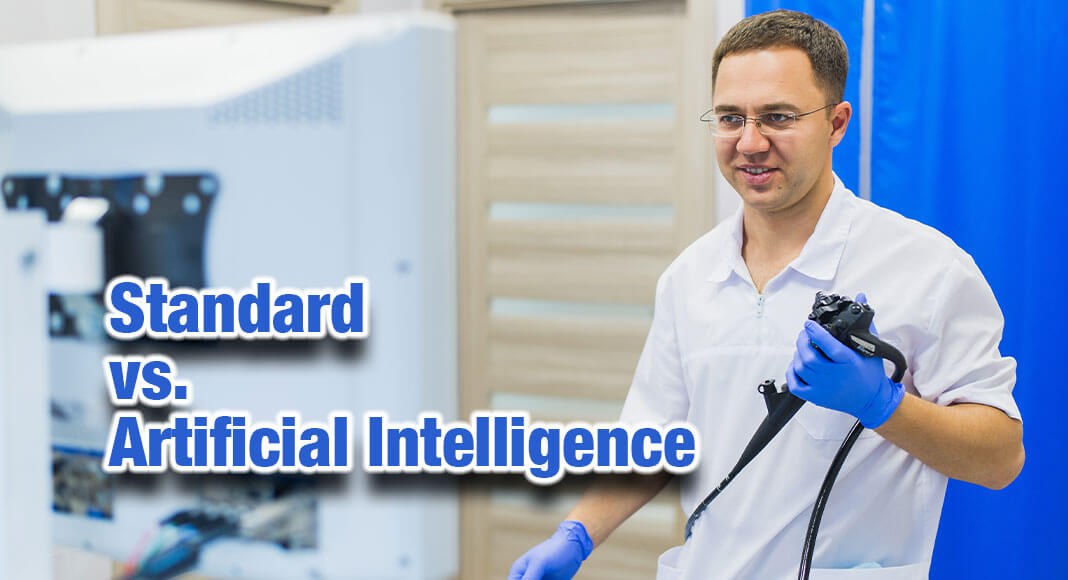
Mega Doctor News
by Mayo Clinic
Newswise — JACKSONVILLE, Florida. — Artificial intelligence reduced by twofold the rate at which precancerous polyps were missed in colorectal cancer screening, reported a team of international researchers led by Mayo Clinic. The study is published in Gastroenterology.
Most colon polyps are harmless, but some over time develop into colon or rectal cancer, which can be fatal if found in its later stages. Colorectal cancer is the second most deadly cancer in the world, with an estimated 1.9 million cases and 916,000 deaths worldwide in 2020, according to the World Health Organization. A colonoscopy is an exam used to detect changes or abnormalities in the large intestine (colon) and rectum.
Between February 2020 and May 2021, 230 study participants each underwent two back-to-back colonoscopies on the same day at eight hospitals and community clinics in the U.S., U.K. and Italy. One colonoscopy used AI; the other, a standard colonoscopy, did not.
The rate at which precancerous colorectal polyps is missed has been estimated to be 25%. In this study, the miss rate was 15.5% in the group that had the AI colonoscopy first. The miss rate was 32.4 % in the group that had standard colonoscopy first. The AI colonoscopy detected more polyps that were smaller, flatter and in the proximal and distal colon.
“Colorectal cancer is almost entirely preventable with proper screening,” says senior author Michael B. Wallace, M.D., division chair of gastroenterology and hepatology at Sheikh Shakhbout Medical City in Abu Dhabi, United Arab Emirates and the Fred C. Andersen Professor of Medicine at Mayo Clinic in Jacksonville, Fla. “Using artificial intelligence to detect colon polyps and potentially save lives is welcome and promising news for patients and their families.”
In addition, false negative rates were 6.8% in the group that had the AI colonoscopy first. It was 29.6% in the group that had standard colonoscopy first. A false-negative result indicates that you do not have a particular condition, when in fact you do.
The study’s senior author and principal investigator is Michael B. Wallace, M.D., of Sheikh Shakhbout Medical City in Abu Dhabi, UAE and Mayo Clinic in Jacksonville, Fla. Co-authors include Cesare Hassan, M.D., Ph.D, of Nuovo Regina Margherita Hospital in Rome, Italy; James East, M.D., of John Radcliffe Hospital in Oxford, U.K., and Mayo Clinic Healthcare in London; Frank Lukens, M.D., of Mayo Clinic in Jacksonville, Fla.; Genci Babameto, M.D., of Mayo Clinic Health System in La Crosse, Wis.; Daisy Batista, M.D., of Mayo Clinic Health System in La Crosse, Wis.; Davinder Singh, M.D., of Mayo Clinic Health System in La Crosse, Wis.; William Palmer, M.D. of Mayo Clinic in Jacksonville, Fla.; Francisco C. Ramirez, M.D., of Mayo Clinic in Scottsdale, Ariz.; Tisha Lunsford, M.D., of Mayo Clinic in Scottsdale, Ariz.; Kevin Ruff, M.D., of Mayo Clinic in Scottsdale, Ariz.; David Cangemi, M.D., of Mayo Clinic in Jacksonville, Fla.; Gregory Derfus, M.D., of Mayo Clinic Health System in Eau Claire, Wis. Victor Ciofoaia, M.D., another co-author, was affiliated with Mayo during the study, but has since left Mayo.
Cosmo Artificial Intelligence-AI Ltd. funded the study.
Dr. Wallace has financial interests in Verily, Cosmo Pharmaceuticals, Fujifilm, Olympus and Virgo.









